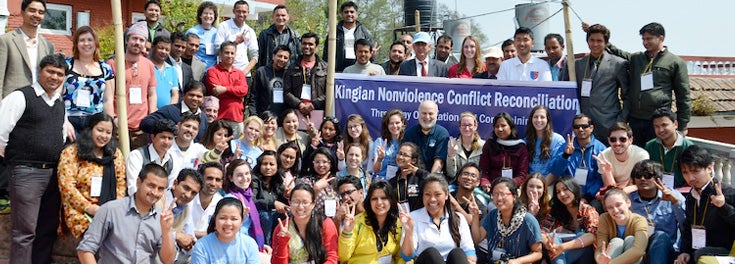
The Center for Non-Violence and Peace Studies at URI is spreading the message of peace to hundreds of thousands of people around the world. And if you’re interested in promoting human rights and social justice, you can help deliver peace to the world, too.
Every year at URI’s Kingston campus, the Center hosts a summer institute on Kingian Nonviolence Conflict Reconciliation skills for promoting peace, nonviolence, and social change. In 12 years, more than 600 people from 35 countries—including some of the most violent in the world—have become certified nonviolence trainers at URI, taking the program back to their own communities and working to make a positive change.
“While we are talking about bullying and school shootings in the United States, these are people from places talking about the survival of their country,” said Paul Bueno de Mesquita, director of the Center for Non-Violence and Peace Studies.
More than 600 people from 35 countries—including some of the most violent in the world—have become certified nonviolence trainers at URI, taking the program back to their own communities and working to make a positive change.
They are people like Leonardo Prieto, who’s trained more than 900 individuals about peaceful reconciliation in Venezuela, Ahmadullah Archiwal, whose organization leads trainings on nonviolent civic mobilization in the Kunar province of Afghanistan, and Joseph Kalisa, of Rwanda, who says his country “needs peace and reconciliation more than we need food.”
Kalisa has been through other peace programs, but says URI’s Center for Peace and Nonviolence “is really different, practical, and engaging. They prepare you to take the information back. I will go back home and train more people and they will go out and train more people, and our goal of a better world with less violence will come to be.”
Last summer, Hamish Khan became the very first Pakistani to complete the program at URI. His organization helps refugees and others displaced as a result of natural disasters, extremists, and the war on terror in the Peshawar Valley of Pakistan. “They are so highly regarded, respected and trusted by all of the people of the region that they are generally left alone by the extremists for the good work they do. That makes them ideal to bring the nonviolence and peace work to the area,” de Mesquita said.
Khan is embarking on a partnership with our Center for Nonviolence and Peace Studies to apply nonviolence training and education into his organization’s work. “The goal I have is to learn these nonviolence techniques, approaches, and concepts, and to adapt them to our situation and lead to a beloved community in our area,” he said.
But the work doesn’t stop there, de Mesquita said. “Our program is a train-the-trainer program, and when these people go back to their countries, they are often lone rangers. So it is also important for us to go to them and co-train others with them.”
Nowhere is that exchange more well-developed than in Nepal. Since 2011, Nepal’s Collective Campaign for Peace has welcomed many URI students, majoring in everything from communicative disorders and film studies to pharmacy and business, for joint training with Nepali students from Tribhuvan University.
“We all knew that we were from different backgrounds, countries, and religions, but that we all wanted to contribute to world peace, individually and communally,” said communications major Marilyn Soum ’14, who traveled to Nepal during spring break last year.
